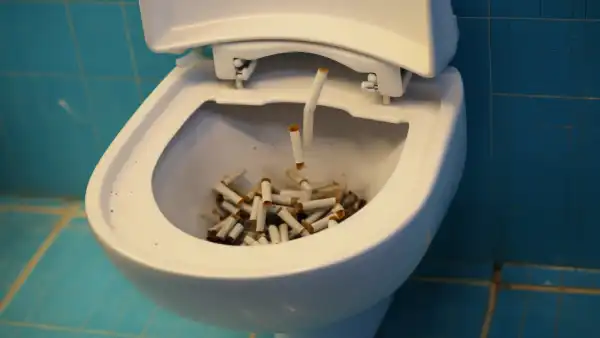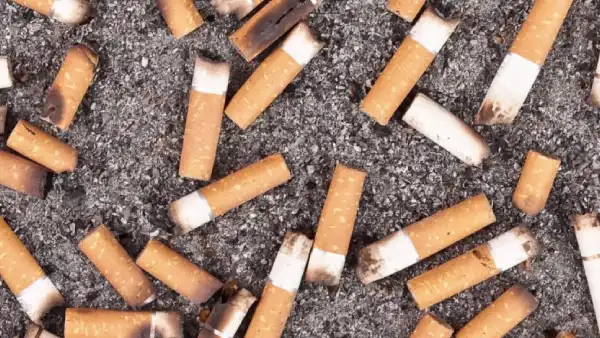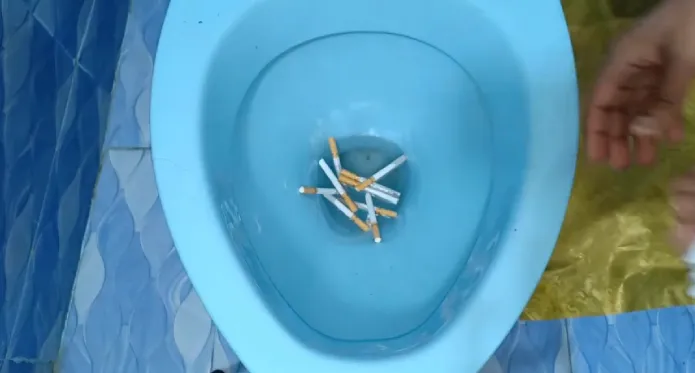Last Updated on October 18, 2023
You may think flushing cigarette butts in the toilet is a good idea. All you need to do is throw the ends in the toilet and press the flush button to flush them. But before you do it, have you considered whether it is a good idea to flush these cigarette ends into the toilet or if any potential risks are involved?
In truth, you shouldn’t flush cigarette butts down the toilet since this can lead to serious problems. Despite being small, these filters can cause significant clogs and harm your septic tank systems.
Over time, these blockages can lead to expensive repairs. They can also contribute to water pollution, harming aquatic life and the environment.
Throughout this article, we will explore why you should never flush cigarettes down the toilet and what other items should also avoid being flushed. Continue reading to keep your plumbing system running smoothly.
Why Should You Not Flush Cigarettes in the Toilet?

Several key points must be remembered when considering flushing cigarettes in the toilet:
- Toilet clogs
- Septic tank issues
- Environmental impact
Let’s take a closer look at these issues:
Toilet Clogs
Cigarette butts, when flushed down the toilet, can cause toilet clogs that are difficult to resolve. Unlike toilet paper, these non-biodegradable cigarette butts don’t easily break down in water.
Instead, they can get trapped in the pipes and create blockages. When this happens, water flow is impeded, and toilets become clogged. Accumulating other debris, waste materials with cigarette butts further exacerbates the problem.
Resolving these clogs can be a major inconvenience and may require professional plumbing assistance. In some cases, the blockage may even affect multiple fixtures connected to the same plumbing system.
Septic Tank Issues
Flushing cigarette butts into the toilet can lead to septic tank issues, such as interference with waste breakdown and costly repairs.
When you flush cigarette butts, they don’t dissolve like toilet paper or human waste. Instead, these non-biodegradable materials can accumulate in your septic tank over time. This buildup can clog pipes and hinder the natural decomposition process of waste in the tank.
As a result, your septic system may become less efficient and more prone to backups or overflowing. Fixing these issues can be expensive, requiring professional assistance and potentially replacing parts of your septic system.
Environmental Impact
Cigarette filters are made of cellulose acetate, which takes years to break down. These filters can end up in waterways and harm aquatic life. Disposing of these butts inappropriately leads to environmental damage due to the inorganic materials and harmful chemicals they contain.
When you flush cigarettes on the toilet, you contribute to water pollution. Moreover, cigarette chemicals can leach into the water when they come into contact with moisture. This can pose risks to the environment and the organisms that rely on clean water for survival.
What Else Should You Avoid Flushing in the Toilet Besides Cigarettes?
There are several key things you should avoid flushing down the toilet.
Paper Towels
If you’re using paper towels in the toilet, only use them for their intended purpose and avoid flushing them into the toilet. While it may be tempting to dispose of these items in the convenience of the toilet, doing so can lead to some serious issues.
Paper towels are not designed similarly and do not break down as easily. Flushing paper towels can result in clogs and potential damage to your plumbing system.
Disposable Baby Diapers
Baby diapers are designed to absorb liquid, and when flushed, they can expand and cause severe clogs in your plumbing system. Flushing diapers leads to potential blockages in your pipes and poses a risk to the environment.
Disposable diapers contain materials that do not break down easily and can pollute our waterways. Also, flushing diapers can strain wastewater treatment plants as they are not equipped to handle such waste.
Sanitary Products
Sanitary products like sanitary pads and tampons should always be thrown out in the trash to prevent plumbing blockages. Flushing them via the toilet can lead to serious issues like clogging and sewage backups.
These products are not designed to break down easily in water and can expand, causing significant pipe blockages. Proper disposal of sanitary products involves wrapping them securely in tissue or placing them in a small bag before throwing them into the trash bin.
Expired or Unwanted Medications
Flushing medications in the toilet is not a recommended method as it can have harmful effects on water quality and aquatic life. When disposing of expired or unwanted medications, research proper disposal methods to ensure safety and environmental responsibility.
Check with your local pharmacy for medication take-back programs or community collection events where you can safely dispose of your unused medications. These programs are designed to prevent the misuse or accidental ingestion of medications and reduce the potential for harm to humans and the environment.
Cotton Balls and Swabs
Cotton products like cotton balls and swabs should not be flushed down the toilet as they can accumulate in your pipes. It is not easily broken down in water and can get tangled up with other debris, causing blockages and clogs. Over time, this accumulation can lead to costly repairs and inconvenience.
Grease and Cooking Oil
Dumping grease and cooking oil down the drain is a surefire way to cause plumbing issues. When you pour these substances into your kitchen sink or toilet, they may initially seem harmless.
But as the grease and oil cool down, they can solidify and form blockages in your plumbing system. These blockages can lead to clogged pipes and backups.
Food Scraps
The pipes in your home are designed to handle only human waste and toilet paper. When you flush food scraps, they can get stuck in the pipes or create blockages that prevent proper water flow. Over time, this can cause backups and even burst pipes.
Even small food particles can accumulate and contribute to clogs in your pipes. When disposing of food scraps, always throw them in the trash instead of flushing them into the toilet.
How Should I dispose of cigarette ends?

Placing cigarette ends in a trash bin is the best disposal method. But before throwing the cigarette ends in the garbage, extinguish the fire properly. You can simply soak the butts in water and place them in a black disposal bag.
Once the fire is out, place the extinguished cigarette end in a black disposal bag to prevent any residual odor or smoke from spreading. This method helps contain the waste and ensures proper disposal.
Stop Flushing Cigarettes: Protect Our Waterways and Environment.
Flushing cigarettes through the toilet is inconvenient and hazardous. It can cause clogs, disrupt septic systems, and harm the environment.
Instead, take a moment to properly dispose of your cigarette ends in a designated ashtray or an appropriate trash bin. By doing so, you can help protect our waterways and ensure that your waste is disposed of responsibly.
Also, other items like paper towels, diapers, sanitary products, and food scraps should never be flushed down the toilet. It may seem convenient, but the long-term consequences can be costly and harmful. So, let’s all do our part in keeping our toilets and oceans clean.

